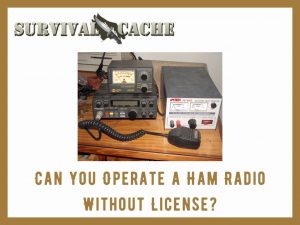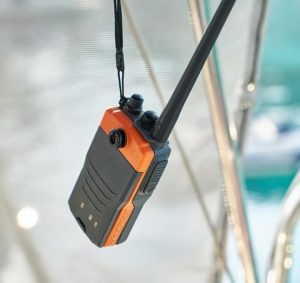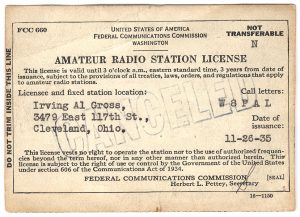Emergency communications is always a hot topic among preppers and survivalists. How do you stay in touch in the case of a major disruption of services? Many see the amateur radio bands, most often HAM, as a fallback communications system.

The problem many preppers have with HAM operations is the need to be licensed by the FCC to operate a radio legally. Many won’t go to the trouble of studying and taking the test to get even the entry-level license. Many find themselves in a conundrum and raise the question, “Can you operate a ham radio with a license?”
The short answer is “No.” Using a HAM radio to transmit without a valid FCC license is illegal and can be punishable by fines and the confiscation of your radio equipment. Nothing prevents you from listening to your radio but, without a valid license, pushing that talk button is forbidden. There are some exceptions to this rule, but they are narrowly defined.
If you have HAM radio equipment (like a handheld HAM radio) and you want to use it for emergency communications, there are several good reasons to spend the time to get your license. Some of those include
- Passing the test ensures that you are aware of and understand the basic rules for operating a radio legally
- Studying for the test will give you a better understanding of the operation and capabilities of your equipment
- To become proficient at radio communications, you need to practice, and to do that, you need a license.
SKIP AHEAD
The Exceptions – Emergency Radio Communications

The FCC has carved out some limited exceptions to the licensing and use rules for amateur radio. These exceptions are narrow and, unfortunately, not well defined. These vague definitions often lead to confusion about the actual meaning of the rules and how they are applied.
The FCC rule on the emergency use of an amateur radio station by a non-licensed person read
- No provision of these rules prevents the use by an amateur station of any means of radiocommunication at its disposal to provide essential communication needs in connection with the immediate safety of human life and immediate protection of property when normal communication systems are not available. (Part 97.403: Safety of life and protection of property.)
- (a) No provision of these rules prevents the use by an amateur station in distress of any means at its disposal to attract attention, make known its condition and location, and obtain assistance.
- (b) No provision of these rules prevents the use by a station, in the exceptional circumstances described in paragraph (a) of this section, of any means of radiocommunications at its disposal to assist a station in distress. (97.405: Station in distress.)
Most experts interpret these rules to mean that anyone can use a HAM radio station and its equipment when human life is in danger. The use of amateur radio equipment by a non-licensed person to protect property is questionable.
What the Rules Mean in Real Life
In reality, what these rules mean is that if you are not a licensed radio operator and you find a situation where human life is in danger and the only means of communication is ham radio, you can use that equipment to call for aid.
There must be no other means of communication available. These represent exceptional circumstances not often encountered.
What if I Ignore the Rules and Use my Radio Anyway?

You face fines and possible federal jail time for the infraction. And don’t make the mistake of thinking that the FCC won’t find out.
HAM radio operators are jealous of the hobby and the limited frequencies that the FCC allocates to their use. By and large, HAM operators guard their privileges enthusiastically. If you begin earnestly using your radio equipment without a license or valid callsign, eventually, the HAM community will report you to the FCC.
The FCC enforcement division has the manpower and the technical capability to find you. Using sophisticated equipment and techniques, the enforcement agents will triangulate your position and you will receive a visit.
The Fines and Penalties
The federal regulations that govern amateur radio specify the penalties that the FCC may impose of unlicensed operators
- Fines ranging from $7,500 to $10,000 for each infraction of the rules.
- Confiscation of any equipment in your possession
- For repeat offenders or egregious offenses, jail time may be imposed
Why chance the penalties and fines. Getting a HAM radio license is easy and cheap. Rather than operate illegally, risk the chances of being caught, take the test, and get on the air.
Why Get Licensed? I Only Want a Radio for Emergencies
There are several reasons to get licensed. Consider some arguments for getting licensed.
The Financial Side
Good radio gear is expensive. Numerous low-cost handheld radios operate in the HAM bands, but most are suitable for short range. To have the benefits of the type of radio you need for real emergency communications, you will want a more powerful and better-built radio. These types of radios, even the handhelds, are not inexpensive.
Why spend money on something you can never use outside of an emergency. You may find yourself across a valley from your companions. There is no life-threatening emergency, so you cannot legally use your handheld radio to call them.
With a license, the use of that radio is open to you. It makes the cost of owning a good handheld radio much easier to justify and allows you to use your radio in any number of situations.
The Operational Side
Operating a HAM radio is not as simple as turning it on and pushing the button to talk. Ham radios are technologically sophisticated equipment and require practice and study to use them effectively. Knowledge of the frequencies is part of the learning process.
The best way to perfect the skills is to get on the air and operate. Without a valid FCC amateur radio licenses, you cannot legally be on the air to gain this experience. When you really need your radio, without the proper training, skills, and practice, it may be almost useless to you.
The Personal Side
You may find that you enjoy your radio and want to explore other possibilities. Imagine making contacts halfway around the world or having the convenience of contacting your other amateur radio friends in your area without cell phones or computers.
Without that license, you can’t enjoy your HAM radio equipment to its fullest fully. Once you experience the possibilities, you may find yourself wanting to expand your HAM radio capabilities.
Amateur Radio Licensing – What is it All About?

The licensing of HAM radio operators dates to 1912 when the Radio Act of 1912 created the Federal Communications Commission and the first amateur radio licenses were issued. The FCC still regulates and licenses the use of the radio frequencies. The federal regulations governing the regulation of radio frequencies and their use is US 47 CFR §(97)
Under the current rules, there are three levels of licensing for Amateur Radio Operators. These three levels of licensing are
- Technician
- General
- Amateur extra
Each level of license grants you more privileges and access to more frequencies and bandwidth in those frequencies. You gain licenses by passing a standardized test.
Technician Licenses – Getting a Foot in the Door
The technician license is the first level and where all amateur radio operators start. This licensing exam covers basic operating rules and regulations, proper procedures, and basic knowledge of ham radios. There no longer any requirement to be proficient in Morse code. The technician license gets the new HAM radio operator access to most of the UFH and VHF bands. The use of the high-frequency bands, where most longer distance communications are possible, is restricted for the technician license holder.
General License Class – Opening the World for Radio Communications
The next step in the licensing process is to take the test for the General License Class. Obtaining the General license opens most of the high-frequency bands to the novice HAM radio operator. Many HAM radio operators are content to remain in the General class license their entire HAM career.
The HF bands are where HAM radio is most popular. Operating in these bands can mean the opportunity to communicate with other operators thousands of miles away. It is no wonder that this is the most popular class of radio license.
Amateur Extra – Getting the Most Out of Your Radio
The amateur extra class of license is the last step in the licensing process. There are a few areas of each frequency reserved for amateur extra license holders. Gaining access to these areas of the bands provides amateur extra license holders the full use of every bit of bandwidth allocated by the FCC.
For those who like to experiment with new technologies, the amateur extra class can provide those possibilities on the edges of the radio frequency frontiers. The extra class designated areas of the bands are often quieter with less traffic and fewer users.
How Do I Get Licensed?

Getting a HAM license is as easy as taking a short test. The Technician license is the first license you must take in the process. Local HAM operators administer the license exams. The Volunteer Exam Coordinators work for no pay to bring new Hams on board.
You can find a local test by visiting the American Radio Relay Leagues (ARRL) site. The ARRL keeps a current list of all tests scheduled around the country.
How Hard is the Test?
The Technician test is only thirty-five questions long and you need only make a 70% score to pass. There are many study guides available for smartphones and your computer. Many of these will school you in the fundamentals as well as provide practice tests. Many of these apps use the exact questions that you will see on the test.
Many who take the technicians test study for only a couple of weeks. The material is not hard. A little diligent preparation will ensure a passing score and your first HAM license and call sign.
Here are some websites that will help you get started studying for the Technicians license exam.
- ARRL Exam Review for Ham Radio™ – http://arrlexamreview.appspot.com/
- Practice Amateur Radio Exams by QRZ – https://www.qrz.com/hamtest/
- Ham Test Online – https://www.hamradiolicenseexam.com/
These are just a few of the many options available to you on the internet.
I Hear a Lot about ARES and RACES. Do I need a License to Participate?
Participation in both ARES and RACES requires a HAM operator’s license. These two organizations are the backbone of emergency communications across the United States. If you decide to get your license, joining and being active with either or both organizations can be rewarding.
Amateur Radio Emergency Services
The ARRL created the Amateur Radio Emergency Services (ARES) organization in 1935. Since that time, licensed HAM radio operators have provided invaluable services. In many instances, these ARES radio operators have been the sole source of communication after disasters and other emergencies.
All ARES members are volunteers who offer their time and equipment to their community when disaster strikes. Anyone who is a properly licensed HAM operator can join an ARES association locally and learn how to participate in these disaster responses.
For more information about ARES, visit the ARRL ARES website at this link.
Radio Amateur Civilian Service (RACES)
RACES was born out of the cold war as a backup for the civil defense system in the United States. The FCC amended US 47 CFR and added §97.407. The rule changes allowed local emergency managers to activate RACES during declared emergencies. In the event the President issues an emergency declaration, only RACES members are authorized to transmit on the HAM bands.
You must find your local RACES organization and make an application to join. In most states, the RACES program is administered by the State Emergency Management office. Each county usually has a designated resource officer that manages the county RACES organization.
In general, the application process will involve providing some personal information, your HAM radio license information, and a background check performed by the local or state governing body.
In the End, it is Your Choice
I hope that this article has answered your question about operating your HAM radio without a license. In truth, you may only operate a HAM radio without a license in situations where a life-threatening situation exists and there are no other means of communication available.
It is your decision in the end, but the ease of getting a HAM operator’s license should be the answer. Study a bit, take the test, and join thousands of other HAM radio operators and me on the air. I hope this article has answered your questions and given you some insight into why anyone concerned with preparedness should become a licensed HAM radio operator. If you have any questions, comments, or experiences to share, please do so in the comments section below.

